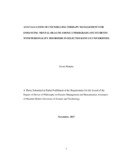| dc.description.abstract | With the ever increasing number of disasters, personality disorders are inevitable. Personality disorders manifest in at least ten different ways, and can usually be diagnosed and managed through psychotherapeutic interventions. The prevalence of these disorders among undergraduate students and the degree to which counselling therapies offered in universities are able to address them is an information gap this study set out to fill. The main objective of the study was therefore to evaluate the effectiveness of the counselling therapy management of personality disorders among undergraduate students with personality disorders in Kenyan universities. Specific objectives were to examine the nature and extent of the personality disorders, examine management of counselling therapies and facilities available, and evaluate effectiveness of counseling services in addressing the personality disorders. Three theories that guided the study were Albert Bandura’s Theory of Social Learning, Ian Pavlov’s Theory of Classical Conditioning and Carl Rogers’ Person-Centred Therapy that were used to construct a conceptual framework depicting the likely relationship between the independent and dependent variables. The study adopted an ex post facto and cross sectional survey research designs in which descriptive and evaluative elements also featured. The target population comprised all students, Deans of Students, Medical Officers and Counsellors in all universities in Kenya. Using the lottery method, 4 universities were randomly selected, from which a study sample size of 404 respondents comprises 384 students, 4 Deans of Students, 12 Student Counsellors and 4 Medical Officers were drawn. The cluster, random and purposive sampling techniques were used. A pilot study was conducted to ensure the validity and reliability of the research tools through pretesting/piloting. For validity, content validity was determined in advance through discussions and consultations with university supervisors and expert judgment of experienced practitioners in the field of counselling therapy. To ensure reliability of the tools, testing was done using Cronbach Alpha’s split-half method. Reliability was calculated from the pilot sample using SPSS and yielded a co-efficient of 0.72, which was deemed reliable as it had met the internal consistency. Data was collected from both primary and secondary sources (questionnaire, interview schedule, observation schedule and literature from relevant offices). Quantitative data collected was analyzed using an online site and the Statistical Package for Social Sciences (SPSS), then Microsoft Excel and presented in graphs, pie charts, tables, percentages and digital photographs. Qualitative data from key informants was received in verbatim, transcribed and recorded in themes. Data from observation checklist was presented in a table and in plates. Findings revealed that there was a high prevalence of personality disorders (94.8%) among undergraduate students, yet majority (83.6%) had never attended counselling, but all those who had (16.4%), reported positively on the impact of counselling. This implies that counseling was effective in helping them to address their interpersonal and emotional problems. The study also found that 75% of the universities were understaffed with regard to the counsellors, and that counselling rooms were poorly furnished. The study recommends that undergraduate students are screened for personality disorders upon entry into university to detect presence of personality disorders and on exit, determine the effect of therapies offered during the course of their studies. It also recommends that staffing be enhanced in all Counselling Departments; better furniture be availed for counselling. It is also recommended that further research be carried out to establish why few undergraduates do not use counseling services. | en_US |

